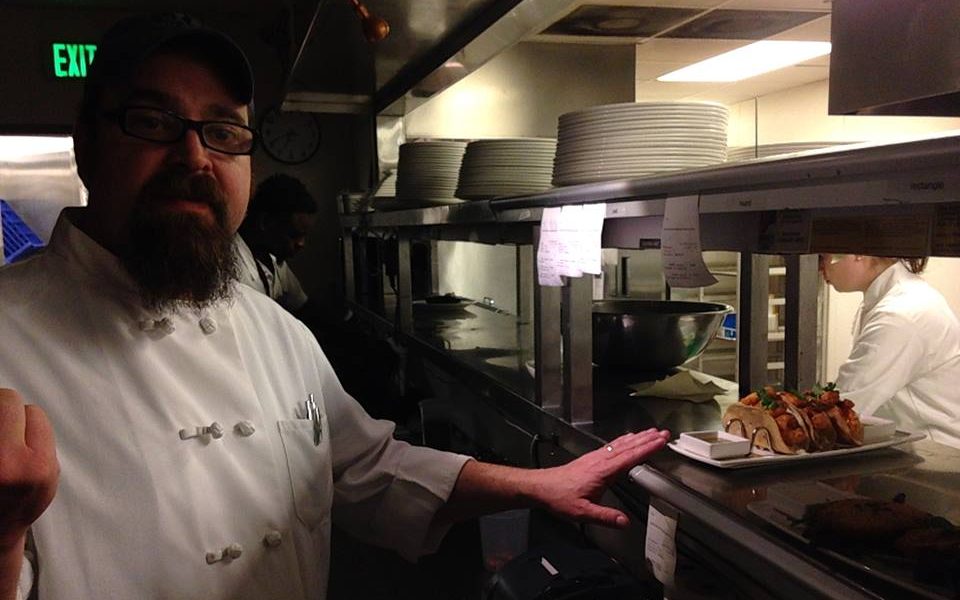 When I was a kid outside of New Orleans in the 1970s and ’80s, my family didn’t go to restaurants much. We ate at home, at neighbors’ houses or with relatives. We bought watermelons off the back of pick-up trucks in the shade of the overpass. We grew the same vegetables in our garden every summer: tomatoes, okra, squash, bell peppers and eggplant. And if my dad didn’t borrow someone’s 16-foot flatboat to trawl for shrimp to fill our freezer, with a little lagniappe to sell on the side, we would buy shrimp or fish from a neighbor who did the same.
When I was a kid outside of New Orleans in the 1970s and ’80s, my family didn’t go to restaurants much. We ate at home, at neighbors’ houses or with relatives. We bought watermelons off the back of pick-up trucks in the shade of the overpass. We grew the same vegetables in our garden every summer: tomatoes, okra, squash, bell peppers and eggplant. And if my dad didn’t borrow someone’s 16-foot flatboat to trawl for shrimp to fill our freezer, with a little lagniappe to sell on the side, we would buy shrimp or fish from a neighbor who did the same.
I didn’t know we were poor — we all lived that way. Restaurants were for other people.
For us, restaurant visits were reserved for special occasions, which necessitated a button-up shirt and ironed pants. A tucked-in shirt and knowing which fork to use wasn’t my idea of fun, so restaurants always felt uncomfortable to me, full of unwritten rules and strange etiquette. I didn’t know what I was expected to do.
To this day, dining in a group causes me angst; I understand classic dishes, exotic ingredients and food words from foreign languages, but I can’t always intuit the intention of the broken English on the menu in front of me. I just want to eat food and listen to fantastic stories; the meal should be about the participants, the diners, the occasion — not about the chef or her staff or her concept.
I didn’t aspire to be a chef. I had no idea that that was even a profession when my high school guidance counselor asked what I wanted to study in college. I think I’ve always had an appreciation for that warm, comfortable feeling of hospitality. And my granny, who was perpetually ornery, prepared food that always made us feel loved. I wanted to cook for people and make them feel that way. After high school, when I needed a job, I thought: Why not employ the old adage and do something I love so I will never work a day in my life?
Now, having worked in restaurants for almost 30 years, the kitchen — any kitchen — will always feel like home. I love the way that diners trust the staff to prepare things that will go into their bodies; that trust is sacred. The bites of food shared in the kitchen or the plates scarfed down at a family meal are not so much about what is on the plate, but that the whole team is fueling up together to go forth and care for the community. Veteran servers have a spiel that doesn’t sound like something written or rehearsed; those words welcome the diner as a guest, not a mark or a customer.
The most memorable meals, like those of my youth, don’t call to mind the food or service, but the souls gathered around the table, the conversation, the occasion. Nothing can compare to my mom’s smothered round steak, but I don’t have any memory of the dish after my parents’ divorce. It wasn’t the provenance of the ingredients that made Granny’s chicken and sausage gumbo so transcendent, it was when she cooked it and for whom that made it memorable. At Lucky 32, we would gladly hand out recipes for anything you could get in the restaurant, but executing the dish at home would never recreate the feeling of being a guest in that dining room attended by well-trained staff.
Culinary miscues and service foibles don’t ruin my dining experience if I enjoy the company of my companions. Even after a bad experience, I don’t ask to see a manager, leave a scathing Yelp review, or even tell friends about it — I don’t want the attention. I just want to enjoy the occasion with my friends and family.
One of the unexpected consequences of working in a kitchen for almost three decades is that, once again, I don’t dine in restaurants all that much. When I do, I prefer to eat between meal periods because I have the place to myself and the experience is less mercantile. Most nights I cook at home, dine in the homes of friends or relish family gatherings so I can feast on nostalgic dishes with relatives.
Even though I now know which fork to use, I still don’t like to tuck in my shirt for any occasion and I squirm in my seat a bit when I’m fussed over in a restaurant. I want to feel like granny is making the gumbo just for me, but I don’t want everyone in on the secret.
Jay Pierce is an award-winning chef who has worked in restaurants throughout North Carolina and the Southeast, and author of Shrimp in the Savor the South series. This is his first piece for TCBites.
Join the First Amendment Society, a membership that goes directly to funding TCB‘s newsroom.
We believe that reporting can save the world.
The TCB First Amendment Society recognizes the vital role of a free, unfettered press with a bundling of local experiences designed to build community, and unique engagements with our newsroom that will help you understand, and shape, local journalism’s critical role in uplifting the people in our cities.
All revenue goes directly into the newsroom as reporters’ salaries and freelance commissions.


Leave a Reply